| Srl | Item |
| 1 |
ID:
164972
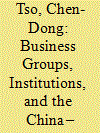

|
|
|
|
|
| Summary/Abstract |
Recent high-level visits between China and Vietnam have prioritized Vietnamese rice exports, with varying results. When the issue was first raised in 2015, rice exports surged dramatically. From 2016 through 2017, they performed poorly despite efforts to encourage them. This paper argues that the buying behavior and lobbying preferences of business groups, made possible by a unique institutional setup, explain the different results.
|
|
|
|
|
|
|
|
|
|
|
|
|
|
|
|
| 2 |
ID:
152183
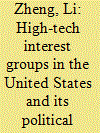

|
|
|
|
|
| Summary/Abstract |
Representing the appeals of its industry, the high-tech interest group has recently become an emerging political force in the United States. With abundant financial resources and proficiency in political communication, the group rapidly grows to be a significant force in the American political sphere. It has started to affect the internal and foreign affairs of the U.S. and played a proactive role in the latest presidential election. Since the high-tech interest group has already become and will continue to be a big player in Sino-U.S. relations, China should carefully deal with its appeals and conflict of interests, and try to develop this group into a stabilizer between the two countries.
|
|
|
|
|
|
|
|
|
|
|
|
|
|
|
|
| 3 |
ID:
101737


|
|
|
|
|
| Publication |
2011.
|
| Summary/Abstract |
What can models of interest group behaviour from American politics tell us about the existence, activities, and influence of international non-governmental advocacy organisations (advocacy INGOs) in International Relations? In this article I detail an analogy between traditional American interest groups and advocacy INGOs in order to suggest a new approach to theorising INGOs. American politics theories of interest groups provide insights to questions which International Relations has been unable to answer satisfactorily, including where INGOs are likely to be found; how INGOs will grow in the future; the organisational structure of INGOs; the impact of competing groups on the quality and content of foreign policy and international agreements; and the roles of INGOs in different stages of the policy process. Viewing INGOs as interest groups provides a curative to the tendency to view them as self-sacrificing knights in shining armour. Competing INGOs representing narrow interests can nevertheless contribute to the common good in the form of effective, efficient policy.
|
|
|
|
|
|
|
|
|
|
|
|
|
|
|
|
| 4 |
ID:
179275
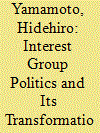

|
|
|
|
|
| Summary/Abstract |
The political reforms that have been going on since the 1990s have drastically changed the face of politics in Japan. The most significant of these reforms was the change of government, which brought an end, albeit only once, to the long-standing Liberal Democratic Party (LDP) regime. These changes were expected to change the power structure by altering the contact of interest groups with political elites. I examine this issue based on a longitudinal survey conducted in four rounds between 1997 and 2017.
The results show a robust structure of interest group politics, although the features were weakening. That is, contacts with the LDP and the bureaucracy were sources of political influence for interest groups. The impact of the two-party system and its setbacks are seen in the change in contact with the Democratic Party of Japan (DPJ). However, The DPJ did not function as a source of interest representation.
|
|
|
|
|
|
|
|
|
|
|
|
|
|
|
|
| 5 |
ID:
061502
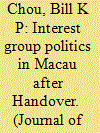

|
|
|
| 6 |
ID:
152980
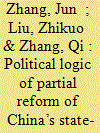

|
|
|
|
|
| Summary/Abstract |
By exploring the composition of the Chinese Communisty Party’s Central Committee since the 1990s, we analyze why state-owned enterprises reform has fallen into a partial reform equilibrium. We argue that two hypotheses, the interest group hypothesis and the adaptive power-sharing hypothesis, should be combined to fully comprehend the partial reform equilibrium symptom.
|
|
|
|
|
|
|
|
|
|
|
|
|
|
|
|
| 7 |
ID:
127790


|
|
|
|
|
| Publication |
2014.
|
| Summary/Abstract |
Interest groups often make their preferences known on cases before the U.S. Supreme Court via amicus curiae briefs. In evaluating the case and related arguments, we posit that judges take into account more than just the number of supporters for the liberal and conservative positions. Specifically, judges' decisions may also reflect the relative power of the groups. We use network position to measure interest group power in U.S. Supreme Court cases from 1946 to 2001. We find that the effect of interest group power is minimal in times of heavily advantaged cases. However, when the two sides of a case are approximately equal in the number of briefs, such power is a valuable signal to judges. We also show that justice ideology moderates the effect of liberal interest group power. The results corroborate previous findings on the influence of amicus curiae briefs and add a nuanced understanding of the conditions under which the quality and reputation of interest groups matter, not just the quantity.
|
|
|
|
|
|
|
|
|
|
|
|
|
|
|
|
| 8 |
ID:
149060
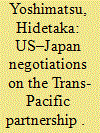

|
|
|
|
|
| Summary/Abstract |
This article explores which factors influenced the process of US–Japan negotiations on the Trans-Pacific Partnership. It argues that while pressures from major societal groups and legislative members hampered progress of bilateral negotiations, state leaders’ preferences for reacting strategically to geopolitical and geo-economic developments played a catalytic role in propelling the negotiations.
|
|
|
|
|
|
|
|
|
|
|
|
|
|
|
|